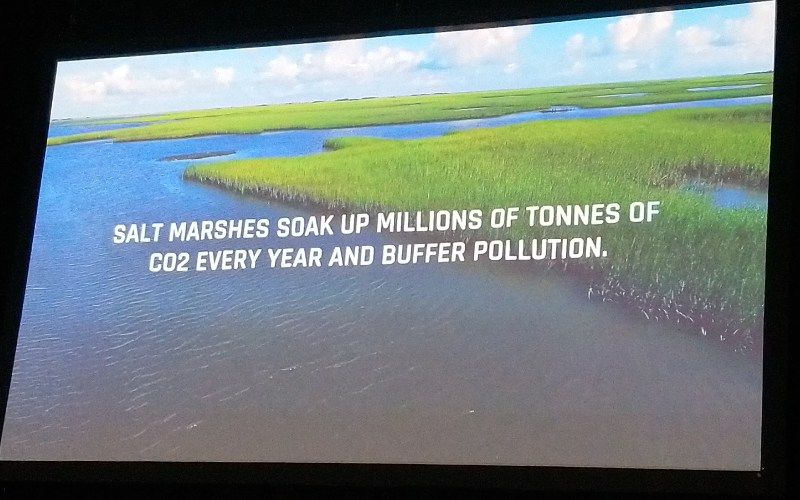You are here
- Home
- Nature-based solutions
Nature-based solutions

COP26 has been bringing together parties from across the world to accelerate action towards the goals of the Paris Agreement and the UN Framework Convention on Climate Change. The Open University has official observer status at COP26 and is learning from the conference to inform the university’s wider sustainability mission and inspire students and staff to take action. Here are some of the conference’s highlights, as told by our Open University observers.
COP26 Diary - 3 November: Dr Kate Symons, Lecturer in Global Development.
Nature-based solutions (NBS) are discussed in several ways at COP, the first and predominant of three framings is outlined here.
1. Carbon credits, greenwashing and the private sector
Nature-based solutions generate carbon credits. Credits are representations of carbon sequestration from nature, often in the Global South, which are traded and sold to offset emissions. Carbon credits are fundamental to Net Zero goals, forming a key plank of Article Six which sets out how carbon trading should be organised. Some sectors will find it impossible to decarbonise, hence carbon markets are attractive to hard-to-decarbonise industries and supply chains, as well as to countries which will be slower to decarbonise. Large organisations with forest product-based supply chains such as Unilever, are keen to start creating and trading carbon credits as part of their business model. However, this leads conservation organisations into rather problematic relationships with industry, something which has been highlighted in political ecology research.
The market-based logic also ties in with an emerging narrative of the host country, the UK, which argues that the private sector responds to incentive rather than heavy regulation. However, the governance and regulation of carbon markets remains an outstanding issue, suggesting that countries are finding it hard to agree on how to create and regulate carbon markets.
Things to watch include:
- The outcomes of Article Six negotiations: How will the proposed global carbon market be structured? How to define emissions? How to define and quantify what can be traded? By whom can carbon credits be traded? Can a country use its own carbon credits to offset its own pollution? These questions are fundamental to emissions reduction, and ultimately whether Article Six is about greenwashing or something more meaningful.
- Who has power in Article Six negotiations? I am hearing that fossil fuel industries are keen to influence the discussion.
- Activists have their sights firmly trained on the co-option of nature-based solutions for greenwashing goals.
- There is a sense of carbon market opportunism, especially from the data and tech sector who are keen to provide tools to make carbon visible and legible within markets.
Clearly this neoliberal framing, whilst comfortable for many only tells part of the story. In the events and process of COP26 there appear to be at least two other clear framings which are outlined below.
2. Ocean Carbon
An enormous screen in the main restaurant at COP26, which attracts most pass holders at some point during the summit, shows films on the importance of the ocean as a carbon store. Ocean-based nature is a growing theme in nature-based solutions, including things like ocean and coastal restoration, ocean rewilding, and restoration of marine biodiversity. The ocean is being positioned at the next frontier of carbon capture, and hence raises questions in relation to the discussion around carbon credits.
Things to watch include:
- The quality and governance of ocean-based projects underpinning carbon credits: What kinds of projects? How would they be set up, monitored and governed? Who is involved and who benefits?
- How would lessons from previous land-based biodiversity offsetting projects like REDD+ be incorporated?
- How to protect ocean and coastal livelihoods in marine carbon credit projects?
3. Counter-hegemonic discussions
It seems easy to find neoliberal framings of nature-based solutions. From a climate justice perspective, it is important to ask what of feminist, indigenous, community-led and pluralistic approaches to nature and climate change. Perhaps it is telling that these have been a little harder to find in the COP26 programme. There are indeed several events and processes involving indigenous people and research groups highlighting the importance of sustainable, democratic projects which respect the right to nature. I will be looking for examples of quality, democratic nature-based conservation projects which have good outcomes for communities.
Related articles
- Accelerating Ambition and Impact: EAUC Conference 2024 30th July 2024
- Driving change: Imagining a different transport future 23rd July 2024
- Donating items to MK Food Bank 21st July 2024
- Butterflies as indicators of our impacts on nature - Climate Perspectives 9th July 2024
- Education for Sustainable Development Changemakers 8th July 2024